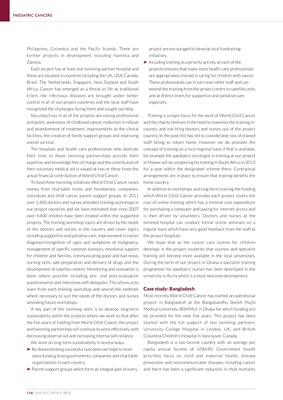
PAEDIATRIC CANCERS
Philippines, Colombia and the Pacific Islands. There are project are encouraged to develop local fundraising
further projects in development including Namibia and initiatives.
Zambia. ‰ Including training as a priority activity at each of the
Each project has at least one twinning partner hospital and projects ensures that many more health care professionals
these are situated in countries including the UK, USA, Canada, are appropriately trained in caring for children with cancer.
Brazil, The Netherlands, Singapore, New Zealand and South These professionals can in turn train other staff and can
Africa. Cancer has emerged as a threat to life as traditional extend the training from the project centre to satellite units
killers like infectious diseases are brought under better and at district levels for supportive and palliative care
control in all of our project countries and the local staff have especially.
recognized the challenges facing them and sought our help.
Key objectives in all of the projects are raising professional Training is a major focus for the work of World Child Cancer
and public awareness of childhood cancer, reduction in refusal and the charity believes in the need to maximise the training in-
and abandonment of treatment, improvements to the clinical country and not bring doctors and nurses out of the project
facilities, the creation of family support groups and improving country. In the past this has led to considerable loss of trained
overall survival. staff failing to return home. However we do promote the
The hospitals and health care professionals who dedicate concept of training on a loco-regional basis if that is available,
their time to these twinning partnerships provide their for example the paediatric oncologist in training at our project
expertise and knowledge free of charge and the contribution of in Malawi will be completing his training in South Africa in 2013
their voluntary medical aid is valued at two or three times the for a year within the designated scheme there. Contractual
actual financial contribution of World Child Cancer. arrangements are in place to ensure that training benefits the
To fund these twinning initiatives World Child Cancer raises home country.
money from charitable trusts and foundations, companies, In addition to workshops and long-term training the funding
individuals and child cancer parent support groups. In 2011 which World Child Cancer provides each project covers the
over 1,400 doctors and nurses attended training workshops in cost of online training which has a minimal cost expenditure
our project countries and we have estimated that since 2007 for purchasing a computer and paying for internet access and
over 4,400 children have been treated within the supported is then driven by volunteers. Doctors and nurses at the
projects. The training workshop topics are driven by the needs twinned hospital can conduct formal online seminars on a
of the doctors and nurses in the country and cover topics regular basis which have very good feedback from the staff at
including supportive and palliative care, improvement in earlier the project hospitals.
diagnosis/recognition of signs and symptoms of malignancy, We hope that as the cancer care system for children
management of specific common tumours, emotional support develops in the project countries that courses and specialist
for children and families, communicating good and bad news, training will become more available in the local universities.
nursing skills, safe preparation and delivery of drugs and the During the term of our project in Ghana a specialist training
development of satellite centres. Monitoring and evaluation is programme for paediatric nurses has been developed in the
done where possible including pre- and post-evaluation university in Accra which is a most welcome development.
questionnaires and interviews with delegates. This allows us to
learn from each training workshop and amend the methods Case study: Bangladesh
where necessary to suit the needs of the doctors and nurses Most recently World Child Cancer has started an operational
attending future workshops. project in Bangladesh at the Bangabandhu Sheikh Mujib
A key part of the twinning work is to develop long-term Medical University (BSMMU) in Dhaka for which funding will
sustainability within the projects where we work so that after be provided for the next five years. This project has been
the five years of funding from World Child Cancer, the project started with the full support of two twinning partners;
and twinning partnership will continue to work effectively with University College Hospital in London, UK, and British
decreasing external aid and increasing internal self-reliance. Columbia Children’s Hospital in Vancouver, Canada.
We work on long-term sustainability in several ways: Bangladesh is a low-income country with an average per
‰ By demonstrating successful outcomes we hope to lever capita annual income of US$690. Government health
more funding from governments, companies and charitable priorities focus on child and maternal health, disease
organizations in each country. prevention and noncommunicable diseases including cancer
‰ Parent support groups which form an integral part of every and there has been a significant reduction in child mortality
114 CANCER CONTROL 2013